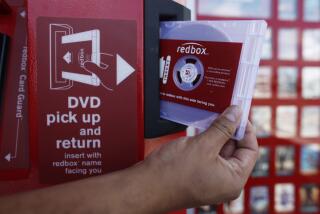Blockbuster Eyeing Video-on-Demand
- Share via
After years of dismissing emerging video-on-demand technologies as so much hype, the Blockbuster video rental chain is getting at least a toehold in the business through an alliance announced Friday with personal video recorder TiVo Inc.
The companies said they hope to launch later this year or in early 2001 a system in which consumers could effectively rent a list of videos electronically through TiVo systems. TiVo is a set-top box with a hard disk drive that allows viewers to record TV shows, skip commercials when they record shows as well as pause, replay and rewind shows they are watching live without missing anything.
Under the system, Blockbuster would download films into TiVo machines through telephone, cable lines, satellite or high-speed access systems such as digital subscriber lines.
Analysts and industry executives, however, questioned whether the limited bandwidth capabilities most people have now will limit the venture, because it could take hours to download a single film two hours or more in length.
As such, Blockbuster and TiVo for now are setting up a system so that pre-selected films in a genre the viewer likes are downloaded into the TiVo machine, perhaps during the middle of the night when the machine is inactive.
A viewer then would be able to select from the predetermined list of films in much the same way movies are available in hotel rooms, or on pay-per-view services cable companies offer.
“It will be a little bit proactive,” said Santo Politi, president of Blockbuster’s new media group. “The technology is there. We’re just enabling it and making it available.”
Another limitation is that films will be available after they can be rented in video stores, mirroring the way films are made available to pay-per-view after they are in stores.
Analysts are skeptical that the system will generate much revenue soon. There remains an infrastructure of some 90 million videocassette recorders in U.S. homes, as well as an additional 4 million DVD players. TiVo has never released numbers on how many of its units have been purchased since it became available last year, but analysts believe it is in the thousands.
Convincing people that the TiVo/Blockuster system is a vast improvement over going to a video store and renting a tape could prove a challenge, as it did for the failed Divx system that attempted to eliminate trips to video store to return tapes.
“Getting a movie to watch at home is something everybody can do now. It can’t just be an incremental improvement,” said Tom Adams, president of Carmel-based Adams Media Research.
The announcement by Blockbuster and TiVo, timed for this week’s Consumer Electronics Show in Las Vegas, was short on specifics, in part because some details, such as easing studio concerns over piracy, are still being worked out.
Entertainment industry sources said they don’t expect Blockbuster, because of its clout as the world’s largest videocassette renter, to have trouble negotiating rights with studios for the TiVo venture. Blockbuster also is partly owned by Viacom Inc., owner of Paramount Pictures.
Still, the announcement carries a symbolic importance and is clearly another hedge by Blockbuster against future technology threats. In November, Internet provider America Online invested $30 million for a stake in its Blockbuster.com unit as part of an alliance between the two companies.
For nearly its entire history through various management regimes, Blockbuster has downplayed video-on-demand’s technological threat to its business despite the conviction by most industry executives and analysts that people from home eventually will be able to select movies electronically from huge libraries of films.
Back in 1993, Blockbuster produced an internal report on the subject that it titled “The Battle That Isn’t Happening.” The report cited such hurdles as the huge capital investment required.
But the technology is clearly arriving, with companies such as Time Warner Inc. on the verge of rolling out video-on-demand systems to its cable subscribers.
More to Read
The biggest entertainment stories
Get our big stories about Hollywood, film, television, music, arts, culture and more right in your inbox as soon as they publish.
You may occasionally receive promotional content from the Los Angeles Times.










